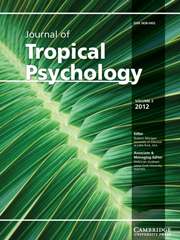Article contents
Collective Guilt and Attitudes Toward Recycling: Data From a North Queensland Sample
Published online by Cambridge University Press: 12 July 2012
Abstract
There is overwhelming evidence that environmental concerns currently facing the modern world are, at least partly, due to the unsustainable use of resources in developed countries. In this study, feelings of collective guilt in members of a developed nation, Australia, were investigated as a factor motivating individuals to recycle. Eighty-five participants from North Queensland (24 male, 61 female; aged 17 to 64, M = 24.16, SD = 8.42) completed self-report measures of collective guilt, social desirability, social norms, attitudes toward recycling and percentage of household rubbish recycled. As predicted, those accepting more collective guilt for the actions of their ingroup reported more favourable attitudes toward recycling. However, collective guilt failed to predict actual recycling behaviour. The same was found for social norms in that they predicted attitudes to recycling, but not the amount of rubbish recycled. Attitudes toward recycling were the only successful predictor of the amount of rubbish recycled. This study has demonstrated the role of the emotion of collective guilt and social norms in one environmentally relevant domain. Avenues for future research regarding the implications of collective guilt on ecological behaviour have been discussed.
- Type
- Articles
- Information
- Copyright
- Copyright © The Authors 2012
References
- 4
- Cited by


